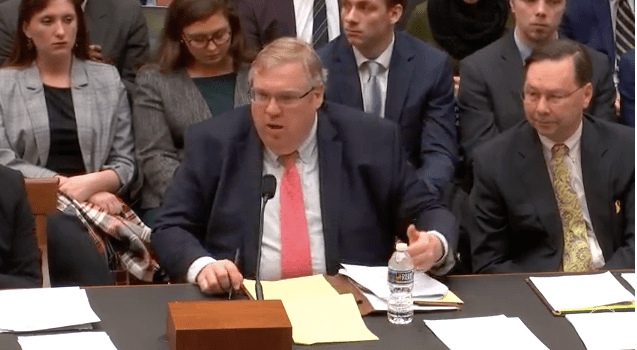Election law attorneys who often oppose each other in court had the opportunity Tuesday to spar from the same witness table.
On one side were two members of President Trump’s bogus voter fraud commission, which was disbanded under a bevy of lawsuits. On the other were voting rights advocates who have led legal challenges to to restrictive election laws.
The occasion was a House Judiciary Committee hearing on Democrats’ package of voting-rights-oriented legislation.
Hans von Spakovsky — an ex-Trump voter fraud commission member, who is involved in various organizations that push restrictive voting laws — accused an voting rights advocate on the panel of “wildly exaggerating” the issue of discriminatory voting practices.
Later on in the hearing, Vanita Gupta — an alum of the Obama Justice Department who now leads the Leadership Conference on Civil and Human Rights — shot back.
“It is important for members of Congress to understand that Mr. Hans von Spakovsky has made a career out of giving misleading testimony,” Gupta said, as she brought up up a federal judge’s opinion in a court case where von Spakovsky testified.
The judge, a George W. Bush appointee, said in her opinion that von Spakovsky had offered “misleading” examples of voter fraud, had “cherry pick[ed] evidence,” and had exhibited a “lack of academic rigor” in his report in the case, Gupta recounted.
Democrats’ proposed legislation, known as “HR 1,” tackles several issues that have long been priorities of the voting rights community, including redistricting reform, early voting, voter registration, felon re-enfranchisement and campaign finance. Senate Majority Leader Mitch McConnell (R-KY) has indicated that he will not bring it up in the Senate.
GOP lawmakers have claimed that the bill is an effort to boost Democratic political advantage, with Rep. Louie Gohmet (R-TX) opining in the hearing that Dems were trying to build their political power with “felons” and “people not here legally who can’t speak the language.”
In a particularly bizarre monologue, Rep. Ken Buck (R-CO) claimed that the “Democrat Party has a long history of stealing elections in this country,” while bringing up “Huey Long in Louisiana” and “the Black Panthers in Philadelphia.”
“The Democrat Party relies on corruption and voter intimidation to win elections,” Buck said, adding that “in 2016, we even witnessed the Democrat Party steal the election from one of its own candidates, as Hillary Clinton’s allies rigged the primaries against Bernie Sanders.”
But some of the sharpest barbs came from the witnesses themselves, who at times called each other out personally and lobbed insults not typical of the usually staid expert testimony offered to Congress. The panel also included two other witnesses, experts in campaign finance and in election ethics, who mostly stayed out of the more acrimonious exchanges during the hearing.
Among the subjects that of bitter disagreement were the terms to use to describe controversial election policies, as J. Christian Adams, another ex-Trump voter fraud commissioner member, argued that the term “purge” was used to scare people about “reasonable” voter list maintenance practices.
“We have lots of euphemisms that we use like ‘list maintenance’ to cover things like purges,” countered Sherrilyn Ifill, who leads the NAACP Legal Defense Fund, as she discussed those practices’ disproportionate affect on minority voters.
“Mr. Adams and Mr. Han von Spakovsky have had years to prove the existence of widespread in-person voter fraud that would justify voter ID,” Ifill said later on in the hearing, “and they have been unable to do it.”
Another heated exchange came after von Spakovsky, in defending voter ID laws, brought up the so-called “reasonable impediment” exceptions — which allow some people to vote without ID if they assert they faced an impediment in obtaining the ID.
“This is the kind of testimony that I think is so disturbing because it is so misleading,” Iffill responded, as she argued that those exceptions were only created because those restrictions were challenged in court.
“It’s this kind of shading of the truth, shading of the reality of what it takes for lawyers and communities to challenge discriminatory voting practices that’s the reason why we need HR 1,” she said.
Adams, in turn, objected to her characterization of the South Carolina’s reasonable impediment exception as being a result of a settlement in that case, arguing that it was in fact based on a court’s opinion.
Democrats on the committee also got fiery as they grilled the GOP witnesses on their efforts to downplay voter suppression.
Rep. Karen Bass (D-CA) pressed Adams and von Spakovsky to respond to the examples highlighted by voting rights advocates of obstacles people have faced in trying to vote.
She said that it was an “embarrassment” and that “people should be ashamed of themselves.”






